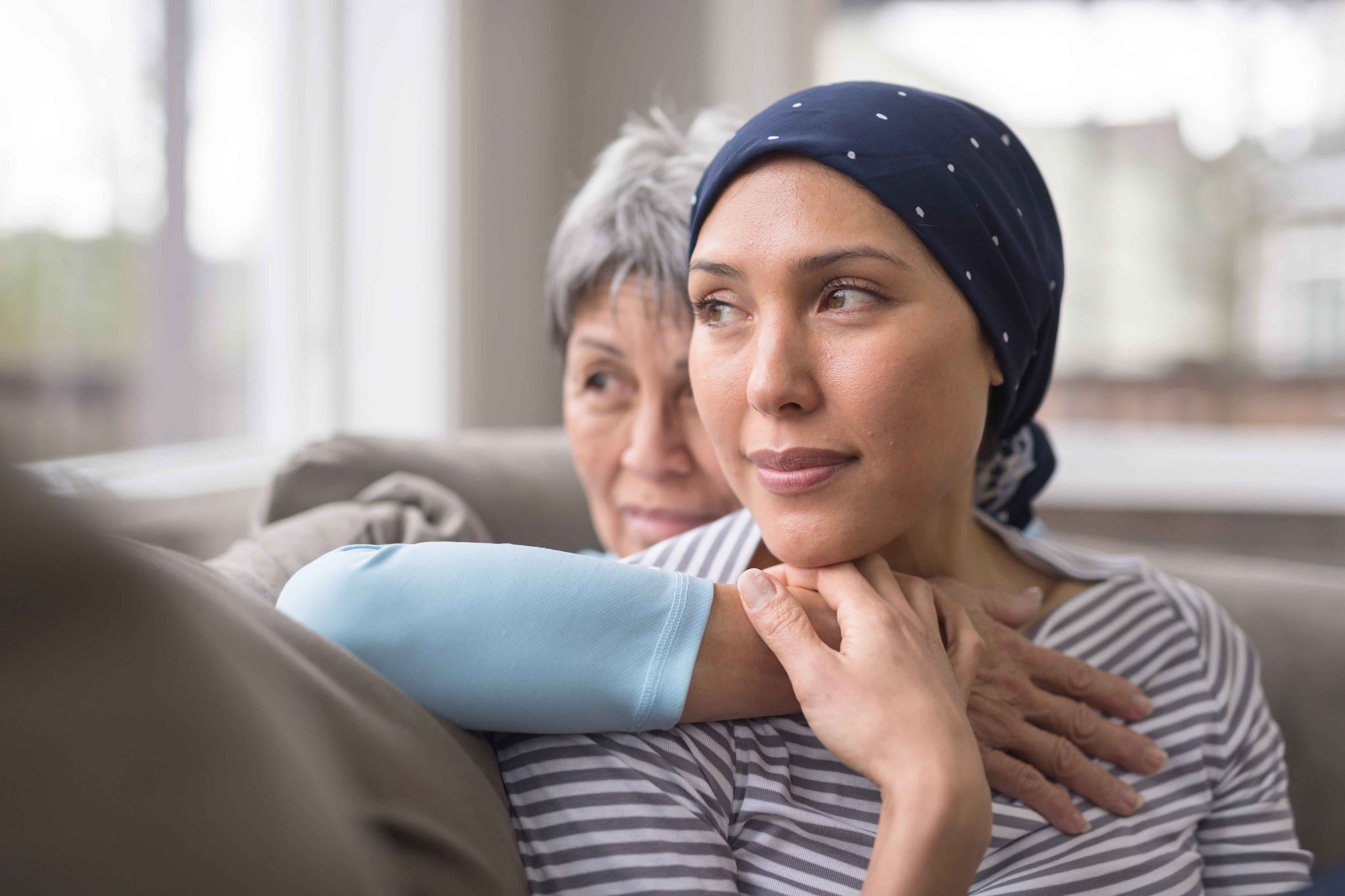- Home
- Conditions we treat
- Gynaecological Cancer
- Cervical cancer
Introduction

Cervical cancer
Learn more about cervical cancer including types, symptoms, risk factors, steps to diagnosis and potential treatment options.
What is cervical cancer?
What is cervical cancer?
The cervix is the lower part of the uterus that connects to the vagina.1 During pregnancy, the cervix helps keep the baby in the uterus until birth.1
Cervical cancer occurs when abnormal cells develop in the lining of the cervix and grow uncontrollably, forming a tumour.2–4 Anyone with a cervix can develop cervical cancer. This includes people who identify as heterosexual, lesbian, gay, bisexual, or transgender.3,5
There are two main types of cervical cancer:2-4
- Squamous cell carcinoma (SCC): The most common type of cervical cancer. It usually begins in the thin, flat cells lining the outer surface of the cervix.
- Adenocarcinoma Develops from glandular cells on the inner surface of the cervix.3,6 This type can be more difficult to detect, as it starts higher in the cervical canal and may not always be reached during routine cervical screening tests.3,6
Cervical cancer may cause one or more of the following symptoms:3,4
- Vaginal bleeding between periods, during or after sex, or after menopause
- Pain during sex
- Pelvic pain
- Heavier or longer-lasting periods
- Changes in vaginal discharge, such as unusual colour, smell, or volume
These are some of the more commonly reported symptoms of cervical cancer.4,7 Symptoms can also be caused by other conditions. If you notice anything unusual or have concerns, it’s important to speak with your doctor.
Cells in the cervix don’t suddenly become cancerous, but instead usually change gradually over time.7
Some known risk factors may contribute to the development of cervical cancer, particularly exposure to the human papillomavirus (HPV).2,4,6
HPV is passed through skin-to-skin contact, most commonly during sexual activity.2 Different strains of HPV carry different levels of risk.2 Not everyone who is exposed to HPV will develop cervical cancer, but almost all cases of cervical cancer are linked to HPV.8,9
While HPV exposure is a key risk factor for cervical cancer, it is not the only factor that needs to be considered.1,8 Other risk factors include::2,3
- smoking
- long-term use of the contraceptive pill (associated with a small increased risk)
- a weakened immune system
- people whose mother was given diethylstilbestrol (DES) during pregnancy, an artificial form of oestrogen used between 1939 and 1971
There is a vaccine available to protect against the HPV types most commonly linked to cervical cancer.8 Your doctor can discuss how HPV is related to cervical cancer risk8 and advise on how to access the HPV vaccine through the National Immunisation Program.

Make an enquiry
Contact us today to find out how GenesisCare can help you.
Diagnosis
Diagnosing cervical cancer
Currently, the most effective way to identify changes that may lead to cervical cancer is through a cervical screening test (previously known as a Pap smear).3,4 In Australia, screening is free and recommended every five years for people aged 25 to 74.2
- Colposcopy – a magnifying instrument called a colposcope is used to examine the cervix more closely
- Biopsy – during a colposcopy, a small tissue sample may be taken and sent for laboratory testing
If anything unusual is found, your doctor will explain what the results mean and discuss the next steps.
Find a doctor
Search for cervical cancer specialists in your state.
Treatment options
Treatment options for cervical cancer

Treatment options for cervical cancer may include:4,10-12
Chemotherapy is an approach to cancer therapy which involves the administration of medicine, usually orally or injection, which is intended to kill cancer cells or minimise their growth and spread. Chemotherapy can be used in conjunction with other cancer treatments.
Radiation therapy may be offered in the early stages of cancer treatment or after it has started to spread. There are different radiation therapy techniques that may be suitable for different cancer types at different stages.
Surgical intervention can be used in some cases to remove the cervix, uterus, and surrounding tissue. Your doctor will consider whether surgical intervention is appropriate for you.
Targeted therapy uses medications that are designed to target and help kill or slow the growth of cancer cells.
Treatment side effects
All cancer treatments can cause side effects, and the type and severity will vary between individuals. You should ask your doctor for detailed information about the possible side effects of any treatment recommended for you.
Find a centre
Search for consulting and treatment locations near you.
Support services
Support services
- Evbuomwan, O., & Chowdhury, Y. S. (2023, May). Physiology, cervical dilation. In StatPearls. StatPearls Publishing. Retrieved July 2023, from https://www.ncbi.nlm.nih.gov/books/NBK539881/
- Choi, J., et al. (2023). Human papillomavirus and cervical carcinogenesis. Pathogens, 12(2), 298. https://doi.org/10.3390/pathogens12020298
- Cancer Council Australia. (2023, March). Cervical cancer. Retrieved July 2023, from https://www.cancer.org.au/cancer-information/types-of-cancer/cervical-cancer
- Burmeister, C. A., Khan, S. F., Schäfer, G., Mbatani, N., Adams, T., Moodley, J., & Prince, S. (2022). Cervical cancer therapies: Current challenges and future perspectives. Tumour Virus Research, 13, 200238. https://doi.org/10.1016/j.tvr.2022.200238
- Berner, A. M., Connolly, D. J., Pinnell, I., Wolton, A., MacNaughton, A., Challen, C., … Richards, C. (2021). Attitudes of transgender men and non-binary people to cervical screening: A cross-sectional mixed-methods study in the UK. British Journal of General Practice, 71(709), e614–e625. https://doi.org/10.3399/BJGP.2020.1105
- Teoh, D., Musa, F., Salani, R., Huh, W., & Jimenez, E. (2020). Diagnosis and management of adenocarcinoma in situ: a society of gynecologic oncology evidence-based review and recommendations. Obstetrics & Gynecology, 135(4), 869-878.
- Institute for Quality and Efficiency in Health Care. (2017, December). Cervical cancer: Overview. In InformedHealth.org. Retrieved July 2023, from https://www.ncbi.nlm.nih.gov/books/NBK279259/
- Australian Government, Department of Health. (2023, July). Human papillomavirus (HPV). Retrieved July 2023, from https://www.healthdirect.gov.au
- World Health Organization. (2022, February). Cervical cancer. Retrieved July 2023, from https://www.who.int/news-room/fact-sheets/detail/cervical-cancer
- National Comprehensive Cancer Network. (2021, October 26). NCCN clinical practice guidelines in oncology: Cervical cancer (Version 1.2022). Retrieved July 2023, from https://www.nccn.org
- Australian Government, Cancer Australia. (2022, September). Cervical cancer: Treatment options. Retrieved July 2023, from https://www.canceraustralia.gov.au
- Cohen, P. A., et al. (2019). Cervical cancer. The Lancet, 393(10167), 169–182. https://doi.org/10.1016/S0140-6736(18)32470-X

You are leaving our website
You are now leaving our website. GenesisCare do not control this content and therefore are not responsible for its accuracy or reliability.

You are leaving our website
You are now leaving our website. GenesisCare do not control this content and therefore are not responsible for its accuracy or reliability.
Disclaimer:
This website is provided for information purposes only. Nothing on this website is intended to be used as medical advice, or to diagnose, treat, cure or prevent any disease. It should not be used as a substitute for your own health professional's advice. Any medical procedure or treatment carries risks. Before proceeding with treatment, you should discuss the risks and benefits of the treatment with an appropriately qualified health practitioner. Individual treatment outcomes and experiences will vary.


